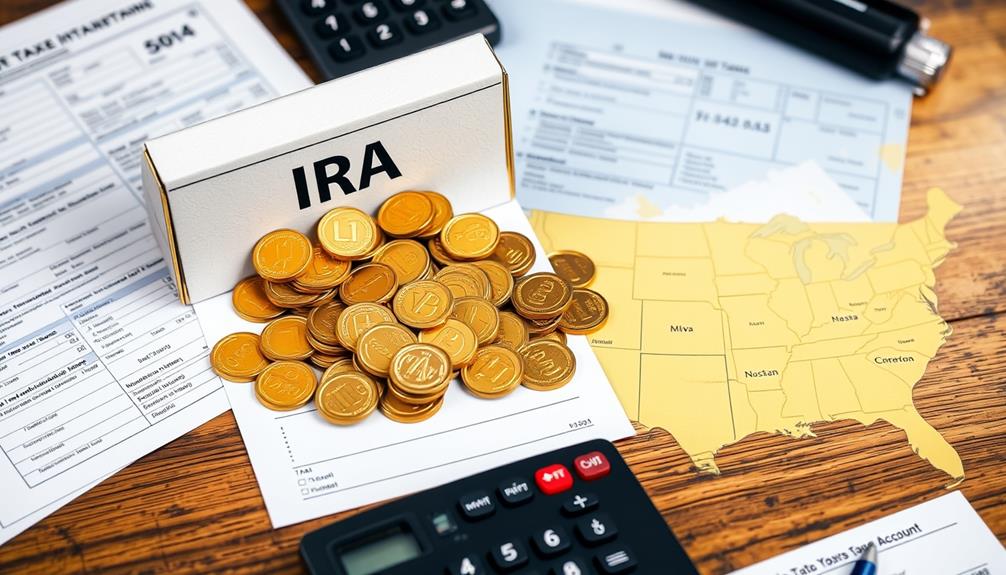When you withdraw from your IRA in Delaware, you will encounter some state tax implications. Withdrawals are partially taxable, but individuals who are 65 or older can take advantage of a tax-free allowance of up to $12,500. For those under 60, only a $2,000 deduction on pension income is permitted. It is worth noting that Delaware does not impose estate or inheritance tax, which is beneficial for retirees. In addition, Social Security benefits are completely exempt from state income tax in Delaware. Being aware of these specific details can assist you in effectively managing your tax liability and improving your cash flow. If you are seeking a tax-savvy approach, there is a lot more to consider.
Key Takeaways
- Delaware partially taxes IRA and 401(k) withdrawals, impacting retirees' net income from these accounts.
- Individuals aged 65 and older can withdraw the first $12,500 tax-free from their taxable income.
- Social Security benefits are fully exempt from Delaware state income tax, enhancing retirees' financial stability.
- Capital gains from IRA withdrawals are taxed as regular income, influencing overall tax liability.
- Delaware has no sales tax and a low property tax rate, benefiting retirees' financial planning.
Overview of Delaware Tax Structure

When considering retirement options, it's essential to understand Delaware's tax structure. The state has no sales tax, which allows you to make tax-free purchases and can be particularly beneficial when withdrawing from your IRAs.
Delaware's average effective property tax rate is relatively low at 0.58%, giving you additional financial relief as a retiree.
Delaware taxes your income based on a progressive scale, with rates ranging from 0% for incomes up to $2,000 to 6.6% for those exceeding $60,000. This structure directly impacts how your IRA distributions are taxed.
Fortunately, Social Security retirement benefits are fully exempt from state income tax, enhancing your tax efficiency.
If you're 60 or older, you can also take advantage of the pension exclusion, allowing you to deduct up to $12,500 of pension income from your taxable income.
This exclusion can notably lower your tax burden on IRA withdrawals, making your retirement income less taxable. Understanding these aspects of Delaware's tax structure can help you make informed financial decisions as you plan for retirement.
IRA Withdrawal Taxation in Delaware

Understanding how IRA withdrawals are taxed in Delaware can help you maximize your retirement income. In Delaware, both IRA and 401(k) withdrawals are partially taxable. If you're 65 or older, the first $12,500 of your income is tax-free, providing significant tax relief.
For those under 60, only a $2,000 deduction on pension income applies.
Here are key points to evaluate:
- Personal income tax rates: These range from 0% on the first $2,000 to 6.6% for income over $60,000, impacting how much you keep from your withdrawals.
- Social Security benefits: Fully exempt from Delaware state income tax, these benefits can supplement your retirement income without additional tax burden.
- No estate tax: Delaware doesn't impose an estate or inheritance tax, which can be advantageous for your financial planning and legacy.
Understanding these aspects of IRA withdrawal taxation in Delaware will empower you to make informed decisions and optimize your retirement strategy.
Keep these factors in mind as you navigate your financial journey in retirement.
Social Security Tax Exemption

Have you considered how the tax treatment of Social Security benefits can impact your retirement planning? In Delaware, Social Security benefits are fully exempt from state income tax, providing significant relief for retirees. This exemption not only enhances your financial stability but also simplifies tax planning, allowing you to retain more of your overall retirement income.
Delaware's favorable stance on Social Security aligns with its broader strategy to attract retirees seeking tax-friendly states. With no tax on Social Security, your tax burden on retirement income remains low, making it an appealing option for those planning their golden years.
Here's a quick overview of the Social Security tax exemption in Delaware:
| Feature | Delaware | Other States |
|---|---|---|
| State Income Tax on Social Security | None | Varies by state |
| Impact on Financial Stability | Enhances financial security | May increase tax burden |
| Attractiveness for Retirees | Highly attractive | Less appealing |
Tax Deductions for Retirement Income

When planning your retirement income, understanding the available tax deductions can make a significant difference.
In Delaware, age-based deductions and exemptions for pension and IRA income can help lower your overall tax liability.
Let's explore how these deductions work and what benefits they offer for retirees like you.
Retirement Income Deductions Overview
Steering through retirement income deductions can greatly influence your overall tax burden, especially in states like Delaware. By understanding these deductions, you can optimize your retirement income and enhance your financial flexibility.
Here are some key highlights of Delaware's retirement income deductions:
- Pension Income: If you're aged 60 or older, you can exclude up to $12,500 of pension income from state income tax. Those under 60 can deduct $2,000, helping to reduce your taxable income.
- Social Security Benefits: These benefits are fully exempt from state income tax, allowing you to keep more of your hard-earned money.
- IRA Withdrawals: Delaware permits deductions for IRA and 401(k) withdrawals, further supporting your retirement income strategy.
With state income tax rates ranging from 0% on the first $2,000 to 6.6% on income exceeding $60,000, understanding these deductions becomes essential.
Age-Based Deduction Benefits
As you navigate your retirement years, understanding age-based deduction benefits can greatly enhance your financial landscape. In Delaware, retirees aged 60 and older can take advantage of a pension exclusion, allowing you to deduct up to $12,500 from your taxable income each year. This benefit considerably reduces the taxes on your retirement income.
If you're under 60, don't worry; you can still claim a $2,000 deduction on eligible pension income, helping to lower your taxable income.
For those aged 65 and older, Delaware offers an additional exclusion, making up to $12,500 of your income from retirement sources tax-free. This further boosts your retirement income retention.
Plus, it's worth noting that Delaware doesn't tax Social Security benefits, making it even more appealing for retirees who rely on these funds as a primary income source.
The state's income tax rates are also favorable; higher rates only kick in if your income exceeds $60,000. This means many retirees can enjoy a more manageable tax burden, allowing you to keep more of your hard-earned savings in your pocket.
Pension and IRA Exemptions
Understanding pension and IRA exemptions can greatly affect your retirement planning. In Delaware, these exemptions can notably lower your taxable income, especially if you're 60 or older. You can exclude up to $12,500 of pension income from Delaware income tax, giving you substantial tax relief during your retirement years.
Here are a few key points to keep in mind:
- The first $2,000 of pension income is exempt for individuals under 60, allowing you some tax benefits even if you retire early.
- Social Security benefits aren't taxed in Delaware, which can help maximize your retirement income.
- IRA distributions and 401(k) withdrawals may be partially taxable, depending on your total income.
When planning your retirement, remember that Delaware's income tax rates range from 0% to 6.6%, impacting your overall tax liability.
Additionally, you can also utilize deductions for interest, capital gains, net rental, and dividends to further reduce your taxable income. Understanding these exemptions and deductions can help you keep more of your hard-earned retirement income.
Property and Sales Tax Considerations

When planning for retirement in Delaware, you'll want to take a close look at property and sales tax implications that can impact your financial situation.
One significant advantage is that Delaware has no sales tax, meaning you can make purchases without incurring extra costs, which is especially beneficial when withdrawing from IRAs or other retirement accounts.
The average effective property tax rate in Delaware is just 0.58%, which is lower than many other states. This could ease the financial burden on retirees who own property.
Additionally, if you're a senior resident, you may qualify for a school property tax credit of up to $500, providing further financial relief.
While Delaware doesn't tax Social Security benefits, keep in mind that other forms of retirement income, including IRA withdrawals, may be subject to state income tax rates ranging from 0% to 6.6%, depending on your total income level.
Also, capital gains are taxed as regular personal income, affecting your overall tax liability when you withdraw funds from capital assets.
Understanding these property and sales tax considerations can help you make informed decisions about your retirement finances in Delaware.
Planning for Retirement Taxes in Delaware

Planning for retirement taxes in Delaware requires careful consideration of various factors that can greatly impact your financial well-being. Understanding the state income tax implications of your IRA withdrawals is essential, as rates range from 0% for incomes up to $2,000 to 6.6% for incomes over $60,000.
When planning your finances, consider these key points:
- You can exclude up to $12,500 of pension income from state taxation if you're 60 or older.
- Social Security benefits are fully exempt from state income tax, providing vital relief.
- Delaware's low property tax rates, averaging 0.58%, can help you manage your overall retirement expenses.
Incorporating these tax advantages into your financial planning can make a significant difference.
Remember that while IRA withdrawals are taxable, strategic distributions can minimize your state income tax burden. If you rely on Social Security benefits and pension income, you'll find Delaware offers a favorable tax environment for retirees.
Frequently Asked Questions
Are IRA Withdrawals Taxable in Delaware?
Yes, IRA withdrawals are taxable in Delaware. You'll need to report them as income, and depending on your age and the amount, different tax rules may apply. It's wise to consult a tax professional for guidance.
Do You Pay State Income Tax on IRA Withdrawals?
Yes, you pay state income tax on IRA withdrawals in Delaware. Traditional IRA withdrawals are taxable, while Roth IRA withdrawals might be tax-free if specific conditions are met. Plan your strategy accordingly to minimize taxes.
What Is the State Income Tax for Delaware?
When it comes to Delaware's state income tax, you've got a mixed bag. Rates range from 2.2% to 6.6%, depending on your income. Remember, income up to $2,000 is tax-exempt, though!
How Do States Tax Retirement Income?
States tax retirement income differently. Some offer full exemptions on IRA and 401(k) distributions, while others tax them based on income levels. It's essential you understand your state's rules to maximize your retirement income.
Conclusion
Steering the tax implications of IRA withdrawals in Delaware can feel like guiding a ship through foggy waters, but with the right knowledge, you can chart a clear course. Remember to factor in the state's unique tax structure and exemptions, which can help you maximize your retirement income. By planning ahead and understanding how different taxes apply, you'll be better prepared for a financially secure retirement. You've got the tools—now make the most of them!









